CRJ 14:3 out now!
The CRJ team has been out and about these last few months, attending events, and helping with conference input, always listening and learning. Because this is the best – and only – way to find out the trends to watch, what is keeping our people awake at night and what our readers need to know.
And what we have learnt is reflected in our content this edition – we cover natural hazards, governance, extremism, community and public issues, human factors and leadership, corporate resilience, technology and kidnap, extortion and ransom.
Here’s a summary of what you can look forward to. Articles will be available to subscribers online and via hard copy very soon. For more details on subscribing, click here.
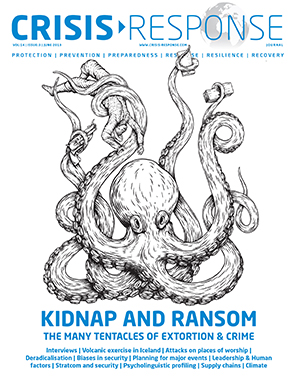
Comment
Gambling with crisis: Perhaps we hold some wild cards?
Emily Hough concludes the second part of this comment by looking at some possible solutions to some of the global problems we are facing today.
Weaponising strategic communications
As a tool to help reach a goal or convey a specific message, strategic communication (stratcom) is nothing new. Companies, politicians and governments do it all the time. But it has increasingly become a vital part of the hybrid toolbox as a comparatively cheap and efficient way of influencing a target audience, explains Ørjan Karlsson.
Natural hazards
Climate: More than a storm in a teacup
Earlier this year, Emily Hough chaired a the keynote session at EENA 2019, featuring Alice Hill, who is former Special Assistant to President Barack Obama and Senior Director for Resilience for the US National Security Council. Afterwards, Emily caught up with Hill to discuss her views on where we are today in terms of national climate change mitigation.
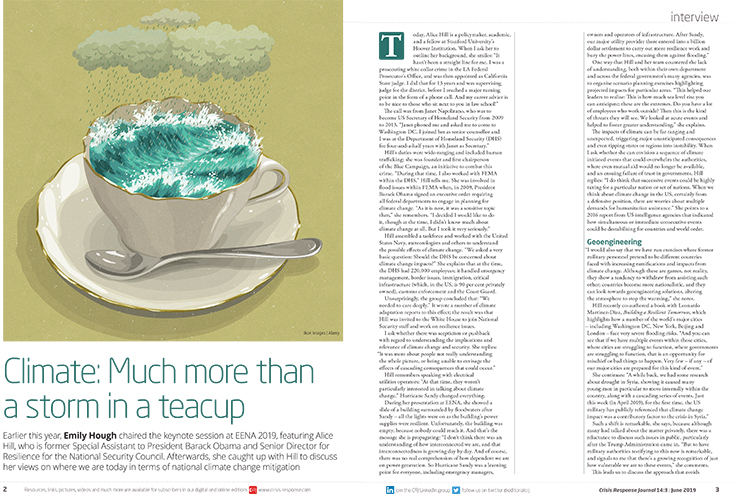
Climate change and education
Despite efforts to raise awareness of the risks, media outlets are not giving the issue of climate the urgency or coverage it requires for people to stand up and take action to tackle the issues associated with this global crisis. What is the role of higher education institutes? Emma-Jane Beattie, from the University of Wolverhampton – a CRJ Key Network Partner – investigates the issue.
Looking on the bright side
Terrorism, security, climate, famine, pollution, war, politics – amid all the pessimism, sometimes it takes one person to stand up and put everything into perspective. The truth is, humanity has made a lot of progress, Rohini Swamanathan tells Emily Hough.
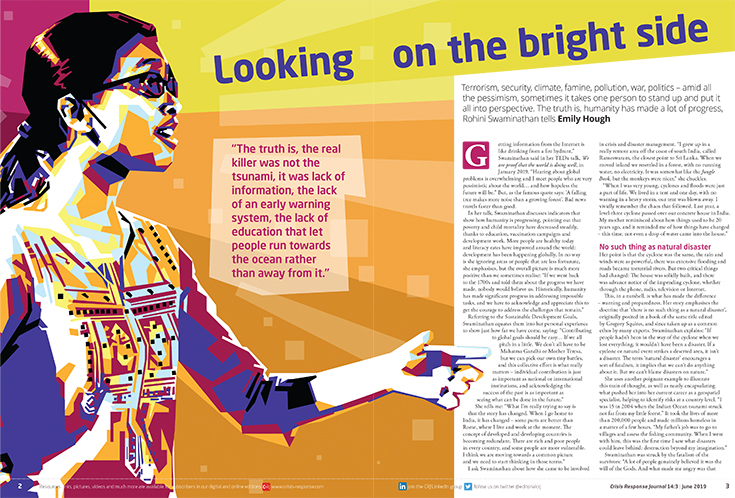
Governance and informal settlements
It is estimated that around 70 per cent of today’s urban growth takes place without formal planning, turning informality into the most common, and risky, form of urbanisation on the planet, according to Vicente Sandoval of the Extreme Events Institute
Preparing for volcanic eruption
Dóra Hjálmarsdóttir describes a large-scale emergency exercise that was recently held in Iceland, based on the scenario of a major volcanic eruption. To make it more complex, the eruption took place during a pandemic, so only 36 per cent of the workforce was fit and available to respond
Extremism
Some unusual characteristics of the Christchurch shootings provide important lessons for intelligence and police services, crisis managers and emergency responders – regionally, and internationally – according to Neil Fergus
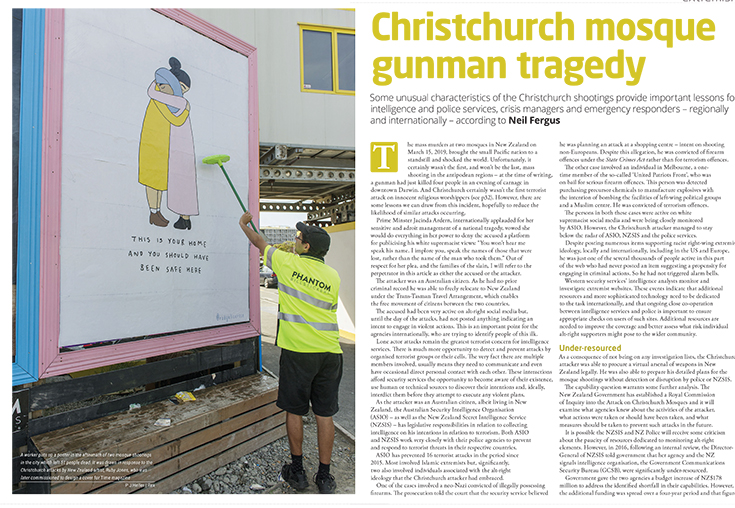
Protecting places of worship
Killing people at their religious sanctuaries is one of the oldest acts of human barbarism and it continues to this day. But protecting places of worship is a fundamentally difficult issue, because many of them pride themselves on being open and welcoming, thereby presenting an inherently soft and attractive target for those who wish to cause harm and spread fear. Lina Kolesnikova explores this challenge
Radicalisation detection programmes: Cost or investment?
Radicalisation can have a very high impact on different aspects of society, from long-term polarisation of society, to casualties and economic damage resulting from a terrorist attack. The sooner it is identified, the easier it is to eradicate, says Olivier Cauberghs
Countering violent extremism: The sword and the shield
Emily Hough speaks to Nicolas Hénin, who spent ten months in captivity after being kidnapped by Islamic State in Syria. Today, he works in countering radicalisation, where his experience as a hostage gives him a unique insight into the minds of foreign fighters who left to fight for IS
Communities & the public
Laypeople: Empowering the epicentre of first response
Rob Fagan contends that the average citizen or layperson has lost their impetus to act in a crisis, having been encouraged to stand aside and let the professionals do their jobs. But the public is increasingly acknowledged as being an invaluable resource, and national training programmes in the US are recognising this with public training programmes.
Social media for emergency risk communication
Monika Al-Mufti Nadig and Joanne Maddams explain how communicating disaster risk reduction can be achieved by bringing positive psychology to emergency risk communication and turning it into an easy and fun game that anyone can participate in, share and talk about. This bridges online social media and offline on the ground reality.
Evacuating disabled children
What happens to disabled children with special needs in large-scale disasters? What needs to be taken into account when planning large-scale evacuations for children with disabilities? Jay Levinson says that Israel is addressing this complex challenge at a national level.
Contingency planning for hospitals
In crises, emergencies or disasters, the first place most people turn to for help is the local hospital. But what if the hospital itself is at the centre of the crisis and finds itself unable to function as it should? And what can we do to make sure people are treatd, supported and helped in the ways they need? Ruth Wozencroft of CRJ’s Key Network Partner Q-bital, explores the issues to be considered.
Critical care on land or in the air
Several non-profit organisations operate specialised air ambulances across Canada to provide critical care and patient transportation, one of the most prominent among them being Ornge, writes Casey Brunelle.
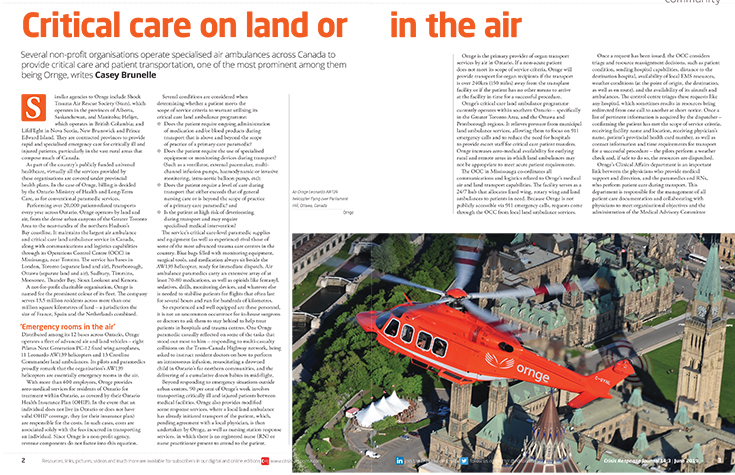
A risk mitigation platform in crisis response
Chris Kemp explores the possibilities of creating a generative risk management platform to aid crisis response in large-scale events, using the Roskilde Festival in Denmark as an example of good practice in the event and festival industry.
A resilient approach to major events
Major events are potentially highly volatile scenarios that reap accolades when carried out successfully, or damage to reputations when they are not, according to CRJ Key Network Partner, MASS.
Leadership and human factors
Everyone is biased…
Paul Martin explores the psychological predispositions and cognitive biases that affect how we perceive and respond to risk, drawing from his recently-published book – The Rules of Security – which examines the complex and continually evolving threats to security.

The unexpected crisis leader
Leaders who are suddenly faced with responding to a true crisis can react in a number of ways – from panic to perfect pivots into productive action – explain Eric McNulty and colleagues, who say you need to understand how your brain works and then work out how to get smarter than it.
What could possibly go wrong?
Based on his long career with the UK’s Royal Air Force, Phil Gilling looks at how to build a team that can make rapid, yet effective, critical decisions during high risk situations.
Kidnap, ransom & negotiation
The murky world of blackmail, extortion and witchcraft
While much is reported on the prevalence of abduction and kidnap, little is known of the often aligned crims of blackmail and extortion. Andre B Brown provides a case study of a crime that aimed to maximise shame and reputational damage on an aid worker and the non governmental organisation that employed him.
Is an orderly trade in hostages in the public interest?
Do insurers and crisis responders promote kidnap for ransom by ordering the market for hostages? Do insurers sustain kidnapping to ensure a steady stream of worried customers beating on their doors, demanding insurance? Or do insurers just mitigate risks? Anja Shortland, who has just published her book, Kidnap: Inside the Ransom Business, investigates and finds evidence to the contrary.
Corporate travel procedures
If you have employees who travel globally, it’s important to have stringent procedures in place so that they are aware of any risks that occur in their destination, in order to keep them safe. Giles Greenfield of CRJ Key Network Partner Markham Special Risks, provides some advice.
A behaviour-based approach to crisis response
Psycholinguistic profiling and behavioural analysis can be extremely powerful tools when negotiating cases of extortion, blackmail and virtual or physical kidnapping, as Stephen Grossman explains.
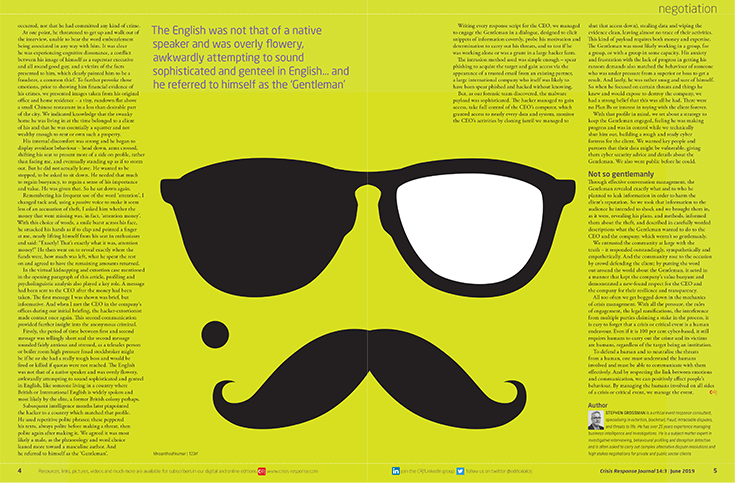
Psychological consultants in hostage and crisis negotiations
Andy Young describes an emerging trend whereby mental health professionals serve with police hostage crisis negotiating teams. This article is a personal perspective, based on direct experience, providing valuable lessons for other departments considering such initiatives.
Traumatic incidents in hostile areas
How best to address the psychological wellbeing of personnel who have been affected by traumatic incidents? Nicola Lester and Jo Anthoine say that a trauma-informed approach could be the answer.
Why do we need Critical Incident Stress Management?
Angela Lewis describes how CISM is a toolbox of items that can be used to support emergency services.
Corporate resilience
Victims and villains
Organisations are often labelled as either a ‘victim’ or ‘villain’ by the public, based on their preconceptions as to the cause of a crisis. Alison Burrell from NYA – a CRJ Key Network Partner – advises on how to avoid becoming the villain in such a scenario.
Supply chains: Global trends, risks and BCM
With the advent of globalisation, outsourcing, enhanced connectivity and higher reliance on suppliers, supply chain disruptions have become more prevalent in recent years, according to Kelsey Rose of DRII. Here are some steps that organisations can take.
R&D
Addressing the world’s water crisis?
David Binns presents news of a solar desalinator that could help to solve many of the world’s drinking water problems.
Next Generation 112: Bringing the future to emergency response
Voice calls have traditionally been the way we alert emergency services to crises for decades, but this is far from the reality of communications today. As we turn towards messenger services, video calls and connected objects, its surprising that most emergency services in Europe can only be reached by a traditional phone call, says Rose Michael of EENA. But all this could be changing…
All change please…
It seems that in any government department at the moment, especially in the UK, change is happening at a faster pace than is probably healthy for continuity. This is especially true for political change and the turnover of ministers in departments. But change is occurring on an international level too, especially in thinking around disaster preparedness and response, according to Philip Ingram, as he introduces this year’s International Disaster Response Expo.
Frontline: Fighting slavery and exploitation
Nick Grono, CEO of Freedom Fund since its inception in 2014, describes its ethos with passion: “We are an anti-slavery organisation that works to fight modern slavery, forced labour, human trafficking and extreme exploitation in its various manifestations around the world.” Claire Sanders reports.
Articles will be available to subscribers only, to subscribe, click here